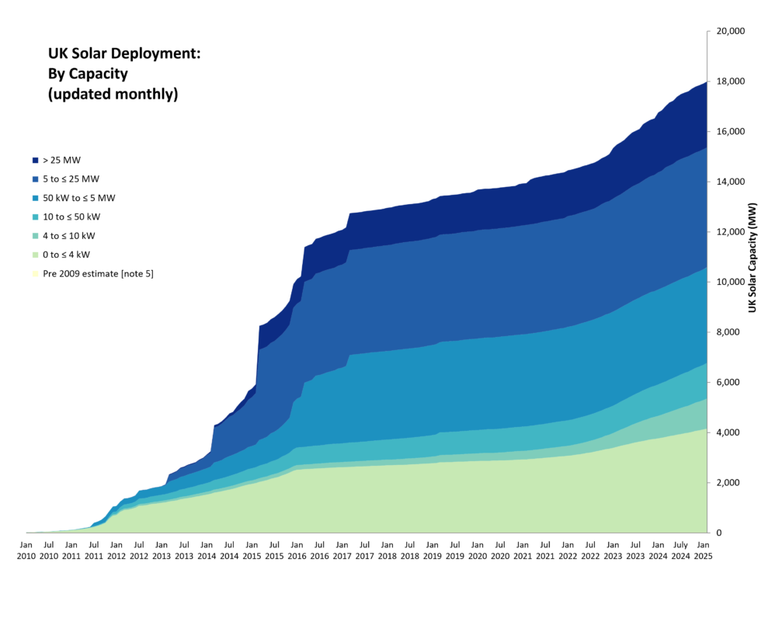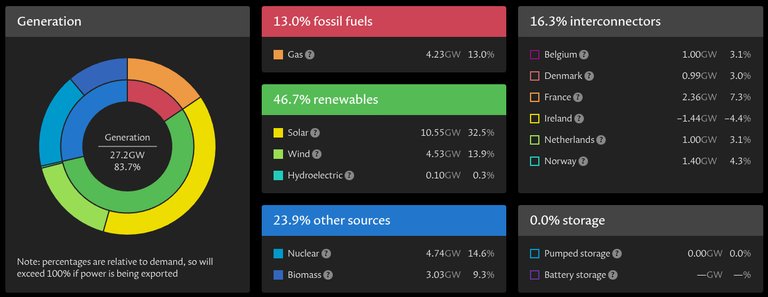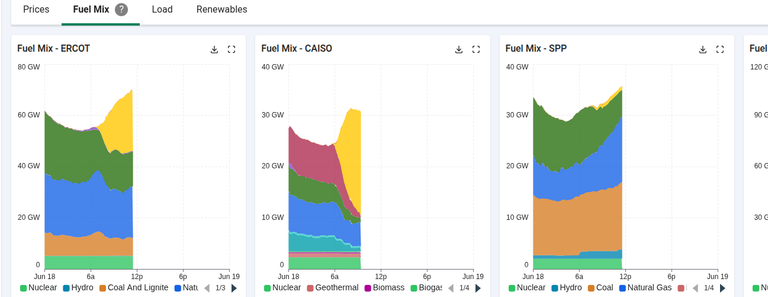The Economics of Solar
I have seen a few people writing about their solar installations on Hive and it is interesting to compare the experiences. @solominer in the USA has a big system that makes him pretty independent of the grid. @cryptoandcoffee is in South Africa where there are some challenges such as a hostile energy company who want to penalise those who could help them out by supplying the grid. That grid is fragile and so there are good reasons to have independent power, but then people would like to earn from exporting.
The UK seems to be friendlier to those who want to get into solar. Previously there have been grants and I think export tariffs (no, not that sort!) have been really good at times. Now you will see houses everywhere with panels in addition to large solar 'farms' across the countryside. Those may cause some controversy, but they may be better than building more polluting power stations.
I found this article with a nice graph of the increase in UK solar capacity. You can see that small systems under 10kW have rapid growth and those are likely to be mainly domestic.

There is a cool site that shows where UK power is coming from. Today it was over 50% from renewables at times. The UK shut down its last coal power station a few years back. There are some new nuclear installations under way (at vast expense) and we import some power from mainland Europe. 30% of our solar capacity is domestic and with prices dropping that could well increase.

I am with Octopus who are the largest UK energy provider after buying up some other companies that had problems. They installed our system and give good rates. We get paid 15p per kWh that we export, so that can be several pounds per day in summer. Octopus have schemes to reward you for using less power when demand is high and there is a new one with incentives to use more when they have an excess of renewable energy. They do this as there are costs for them in either sourcing or disposing of extra power. If people have batteries then they can shift their energy usage or use timers on appliances such as washing machines. We need to be smart in how we use energy.
I also found a site that shows where power comes from in the USA. They have a number of independent system operators with varying mixes of generation. ERCOT covers Texas and CAISO is in California and both have lots of solar (in yellow). The central USA seems to burn a lot of coal and gas. It seems that those industries have a lot of influence with the current regime, but the economics of solar will make it attractive. Most panels are made in China, so the tariffs will be a consideration.

People will say that China uses lots of fossil fuels, but according to this they contribute half of the world's yearly increase in wind and solar power. They still rely on over 60% of their power coming from burning things, but that may well shift. They have some serious pollution issues that will be an incentive. Whatever your views on climate change the pollution from coal, oil and gas is significant. There are new challenges with sourcing other minerals that are needed for batteries and other new technology. The actual solar panels are mostly made of sand which is pretty abundant. Extracting the silicon needs lots of energy, but it is far less than the panels will generate.
It seems to me that a lot of the resistance to solar is politically motivated by the influence of the fossil fuel industry. Burning ancient organisms will not get much more efficient, but solar and battery technologies are still advancing. People can save money by having their own power generation that just does its thing once installed. That needs to be encouraged and supported.
The entire contiguous 48 states are south of England in latitude, so from that alone, solar makes more sense here than there, although local climate and cloud cover may affect that. But England is also notorious for rain. I saw a lot of wind farms on my solar eclipse road trip last year, and that make sense in many regions. Nuclear power originated in Idaho, of all places, and my uncle worked at Hanford down near the Washington/Oregon border on the Columbia River. There are also many hydroelectric dams on the Columbia. But coal and natural gas offer advantages, especially when power demand fluctuates above baseline loads and more generators need to be spooled up quickly to meet demand.
It's hardly rained here for months and the panels work even when it's cloudy, so it can be better than you might think. People up in Scandinavia have panels too.
We don't have a lot of hydro, but there are some hydro storage systems to deliver extra power for a while. Large scale batteries are coming in too. There are definite challenges, but it's not viable to burn fuel like we used to.
Interesting post!
I have installed two panels last year and got financial support from the city. They paid me 150€ after the installation.
Now we use the dishwasher and the washing machine only if sun is shining.
We get our energy from Octopus too. I didn't know they also operating in the UK.
Octopus started here, but I see they have expanded to a few countries. It's great if you can get support for that. I know in Germany a lot of people have panels on their balconies as they will not have their own roof for an apartment. Even a small system can make a difference. We have 20 panels, but then we have a big roof. We export most of what we generate so the system will pay for itself.
It's all a racket for sure and they want to do whatever they can to keep you from taking money out of their pockets. It's good that you have a relatively friendly company there that doesn't penalize you for it.
People have to use their voting and spending power to improve things. I get that it's not so easy when you don't have options. Here we can choose from lots of companies for our energy even though it comes down the same wires.
Yeah, it's pretty much a monopoly around here. You have one choice depending on where you live unless you want to go off he grid and do it on your own.
I think that the rapid expansion of small systems below 10kW is encouraging as it signifies a transition towards more decentralized energy production.
I'm still working on the missus but she quails at the idea of spending 10K which is roughly what it would cost for us without a grant of any kind
We were lucky to have the funds and decided it was what we wanted to do. If the plans to get panels on all new houses go ahead then people will have it anyway.
It's a no brainer to make all new houses have them but I just bet that vested interests push back against that or weaken it somehow
They have been. The house builders want to keep their costs really low even if it means the houses cost more to run. They need to be called out.
Defo. I read that they are skiing on the number of panels etc. So short sighted
My neighbor just got panels installed and says his bills dropped 70%. Wish more countries would follow the UK's example instead of penalizing solar like some places do.
Our bills are down too. People need this option.
They really do
Our opposition is they are scared of losing revenue from those that are the only ones paying and that is not my problem. Renewable is the way forward and when we move back to Europe I will install solar and remain independent off the grid even if it costs a little more to achieve. prices are only going to keep on rising each year as here they are keeping us guessing whether it is 12.38% or 32.7% next month. I have never been happier generating my own power and I think once people see it working they will understand what we see already.
It definitely gives you some protection against rising prices. You have to think long term, but it makes sense.
Realmente eso sonaría futurista en años anteriores , pero la realidad es que en un futuro no muy lejano la energía de paneles solares , ganará terreno exponencialmente es más natural y más efectiva
I think the only advantages that oil, coal and methane (I don't know how they convinced everyone to call methane 'natural gas') are going to be short-lived. One thing that people don't take into account into the economics of fossil fuels is that its going to get more and more expensive over time as the easy-to-get-to, cheap fuel is depleted and companies have to spend more to drill and dig deeper.... AND as more people, companies, regions and countries move towards electrification, those more expensive fossil fuel costs are shared amongst fewer entities... so the remaining people/companies/regions have to pay more individually.
Fossil fuels require a continuous supply, so even if its cheaper to run something right now it won't stay that way, compared to renewables which is often just the upfront cost and then nothing for decades.
China does use a lot of fossil fuels, but they have an aggressive transition plan and at some point they'll have the cheapest energy in the world, and be even harder to compete with economically.
The relative costs are changing with renewables getting cheaper. The vested interests will fight to keep their party going, but that is bad for us all.
I look at it purely economically in my own situation. I spent $22,500 in September last year for a solar and battery system here in Australia. It lets me go off grid and still have power (and charge the battery) in a black out. Could be self-sufficient if I'm careful with energy usage. That self sufficiency is more important as far as I am concerned, compared to the cost, but I am very happy with the costs prevented so far.
So far, since 9 September 2024, I've not spent $2692.54 due to real time usage and exports, and due to using the battery when the sun hasn't been shining, I've not spent a further $814.80
Furthermore, I've gotten a rebate of $980 for installing the battery, and various energy retailer credits of $200, and $150 of grocery gift cards (as a sign on bonus)
So, in less than a year, I've not spent $4837.34 out of my savings.
In less than one year, I've "paid off" 21% of the system. It feels like the best investment I've ever made.
That's a great return so far. Ours will take a few years to pay back, but it's not just economic for us. I just wish I could have done it earlier.
The utility of our parent star has a lot of potential within our reach.
Que tan sostenible es para una persona que no conoce de paneles solares intentar implementar ese tipo de sistemas. Por ejemplo. Como manejar roturas o de manera general que incovenientes puede presentarse en el uso personal de los paneles solares. Esta mas que claro que la soberania y las ventajas son muy grandes pero supongo que tambien tenga sus contras
It needs some electrical knowledge and also about installing properly of course. I paid a company to do mine, but some people do DIY. No solution is perfect, but solar ought to be reliable once set up properly.
@steevc, I paid out 2.548 HIVE and 0.000 HBD to reward 14 comments in this discussion thread.